Following nature's lead on food
Updated: 2013-07-14 09:42
By Sun Ye (China Daily)
|
||||||||
No tomatoes in winter. No oolong tea after Tomb Sweeping Day. Do not treat meat as an everyday staple. The initial impression is that she keeps to the stringent regime of a sustainable lifestyle, but Shi Yan says it's all totally natural - if you live on a farm.
She is probably the best-known advocate of community-supported agriculture in this country, and she is totally committed.
"If you live and feed on the farm, you have more vegetables and grains. And you can only kill a pig once in a while. It cuts down the consumption of meat."
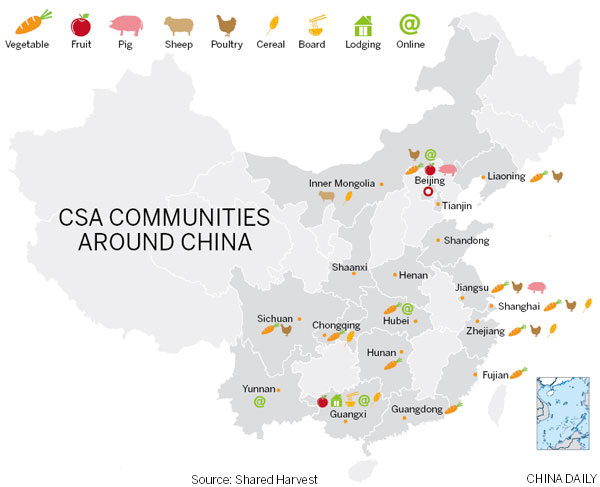
As for the tea, she says oolong tea before Qingming (Tomb Sweeping Day) is better because pesticides are rarely necessary then.
"Whatever nature dictates, it's often the best," the 30-year-old post-doctorate graduates says. She calls herself a "new farmer" and has been preaching the cause for many years in her slow, calm, measured tones.
Shi is on the sustainability lecture circuit, often appearing in a simple linen shift with her hair tied up in a ponytail and wearing sandals that had just trudged through the farm fields. She has been doing this since she came back from six months' of hard labor on the Earthrise Farm in Minnesota in 2008.
"Once you build up an intimate relation with the land, life is different," says the city-bred agriculture scientist from Baoding, Hebei province. It was the hands-on experience from dawn to dusk that taught her the CSA concept from the ground. She wrote a book on her return and quickly became a champion of the movement.
Her first project, initiated with her heavyweight graduate program supervisor Wen Tiejun from Renmin University of China, is Dondon Farm in western Beijing. It made its name as a rented plot of land that hires farmers and promises clean, natural produce for customers who order and pay in advance.
It was a success, although the founder says with all modesty "it was because we broke the ground at the right moment, when concern for food safety was extremely high."
The farm is still thriving after three years but Shi wanted to address the bigger issue - the sustainability of the rural community "where we are determined to live".
As head of the year-old CSA model farm, Shared Harvest, she recruits land-owning farmers who are willing to work on the land themselves. Shi monitors the farming process, markets the produce to customers who are willing to pay for their vegetables in advance, and shows them around when they visit.
"Having another stakeholder means more transparency, customers can get what they want to know not only from us, but also from different farmers," she says, "and if there are disagreements, all the better.
"It is the farmers who benefit from the model more than anyone else. Farming should be rewarding enough to let them stay on the land."
For now, Shared Harvest makes 0.45 yuan for every 500 grams of vegetables sold. It has already cleared the red, and even projects a sizable profit at the end of 2013, when the number of members will exceed 600.
Her hope is that these members will care enough about what they eat to come down to the farms more often and take part in the whole process.
To encourage them, Shi tirelessly updates progress on the plots and posts reports online on her various social network accounts, sharing everything from pop quizzes on botany to the farms' daily delights and woes to quotes from Mother Teresa.
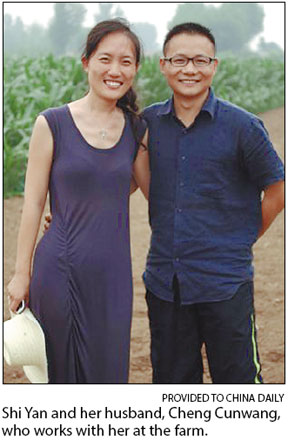
"They ask me why my photos always look so good. I tell them the photos show the love of the photographer," she says as she carefully packs bunches of kale into delivery boxes.
This is all part of her routine, and she attends to it with the eye of a committed lover.
She highlights the beauty of deformed tomatoes and crooked cucumbers with a dash of humor, arranging them into heart and swan shapes that are posted online with a poetic line or two. That's attracted about 30,000 fans to her weibo account.
It's part of her larger plan to educate consumers: That perfect-looking vegetables may not be safe, and that buying from your neighborhood farmer reduces "food miles" and carbon emission.
Yolanda, an expectant mother who is a member of Shared Harvest, is definitely a Shi Yan fan.
"Shi has her feet on the ground, but she upholds an ideal at the same time. I admire her for the stamina and her vision for a better future. I trust her. I've seen the farm myself and I can let go of all my worries about food," she says.
Shi current lives, works and has her research base at Mafang village where she has 40 pigs, 2,000 chickens, 30 geese and three farms. Her loving husband works with her and more than 20 young colleagues who all affectionately call her "boss".
"Shi Yan taught me not to lie," says Chen Li, who is in charge of sales for Shared Harvest. "That's almost against a salesman's instinct. But honesty is the core of our business."
Chen joined the enterprise a year ago because he believed Shi's initiative is "small and beautiful", and that "it could only be done by someone who is adamant and innocent at the same time".
"I marvel at how people are willing to help her because she's so trustworthy," he says.

 French train derailment kills six: media
French train derailment kills six: media
 Chinese female sailors at China-Russia sea drills
Chinese female sailors at China-Russia sea drills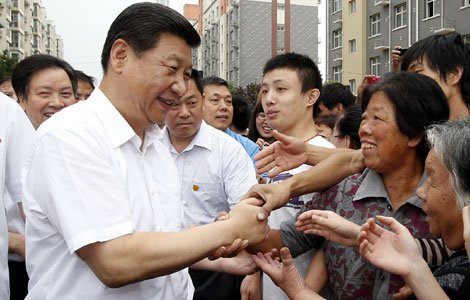
 Xi urges CPC members to keep China red
Xi urges CPC members to keep China red
 China maintains top-level alert for Typhoon Soulik
China maintains top-level alert for Typhoon Soulik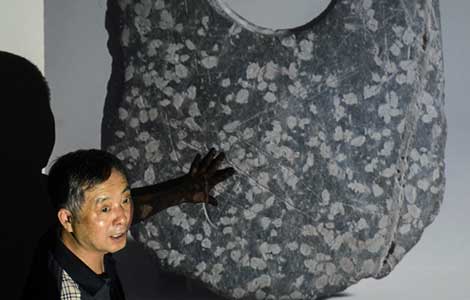
 Inscriptions may predate oracle bones
Inscriptions may predate oracle bones
 Coca-Cola seeks to connect with young customers
Coca-Cola seeks to connect with young customers
 Residents flee from landslides
Residents flee from landslides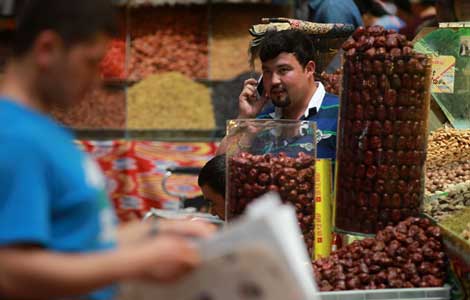
 Tourists say they aren't afraid to travel in Xinjiang
Tourists say they aren't afraid to travel in Xinjiang
Most Viewed
Editor's Picks

|

|

|

|

|

|
Today's Top News
Former S.A President confident of Mandela
US seeking direct nuke talks with Iran
DPRK blames ROK for aborted talks
Death toll rises to 43 in SW China landslide
French train derailment kills six
7 peacekeepers killed in Darfur
3rd Chinese girl dies in Asiana crash
Moscow pileup kills 12, injures at least 19
US Weekly

|

|






